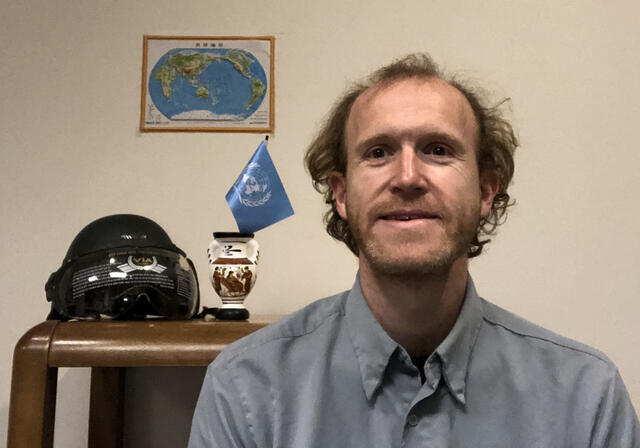New National Security Fellows Program expands students’ career opportunities
Cyber attacks. Pandemics. Hurricanes. Terrorism. Wildfires. Civil unrest. As threats to national security increasingly invade American lives, the need has never been greater for professionals in every field with the knowledge and analytical skills to respond to these risks. McDaniel’s new National Security Fellows Program meets this need head on, giving graduates an edge in a surging market of high-paying jobs in private corporations, non-profit organizations, and government agencies alike.

McDaniel’s Model UN team found time for touring while participating the event in China in 2018.
Cyber attacks. Pandemics. Hurricanes. Terrorism. Wildfires. Civil unrest. As threats to national security increasingly invade American lives, the need for professionals in every field with the knowledge and analytical skills to respond to these risks has never been greater.
McDaniel’s new National Security Fellows Program meets this need head on, giving graduates an edge in a surging market of high-paying jobs in private corporations, non-profit organizations, and government agencies alike.
The fellowship pairs with any program of study, supplementing and enhancing students' majors and minors with a value-added credential relevant to their career, says National Security Fellows Program coordinator Francis Grice. Professionals with a firm grounding in national security are in demand in accounting, cryptology, computer science, world languages, business, transportation, criminal justice, psychology, sociology, statistics or actuarial science, government, foreign service, and more.
“The program has been crafted to provide students with robust knowledge, skills, and experience in national security as well as the ability to specialize in an area of interest, such as interstate conflict, intra-state political violence, cybersecurity, ethics, and human rights,” says Grice, who is an associate professor of Political Science and International Studies and a recognized scholar in the field.

Francis Grice
Selected through a competitive application process, National Security Fellows complete 34 credits by graduation along with some co-curricular requirements such as organizing and attending events. The credits include one required course, Essentials of Security Studies; six credits of pre-professional experiences such as security simulations, internships, research assistantships, and independent studies; and 24 credits of relevant electives from Political Science as well as Computer Science, History, Philosophy, Sociology, and others.
“While it has strong roots in Political Science, national security is a field that increasingly spans across multiple disciplines,” says Grice. “The design of the program will empower students to take numerous electives in departments with relevant courses across the college in a fluid and dynamic way.”
Students choose from 50-plus courses that include Cold War as Global Conflict, Nonviolence: Gandhi, King and Mandela, Artificial Intelligence, National Security in a Changing World, The Nuclear Age, and Gender, Violence, and Crime. They select three significant pre-professional experiences from Model United Nations, European Union, Arab League and other security simulations as well as opportunities to intern, collaborate with faculty on research, and various summer programs.
Fellows receive a $250 grant to spend on a National Security-related event or project during their junior or senior year. They benefit from dedicated National Security advising and guidance and may participate in Foreign Service Preparatory sessions.
For those who are interested in national security but don’t want to commit to it on the level of the Fellows program, there’s a second option to sign up as an affiliate to receive information about events, job and internship opportunities, and professional development activities.
Those who do complete the Fellows program will have solid expertise in the field of national security that will bolster their career prospects through real world experience in the field.
“Fellows will have the knowledge and analytical skills to categorize a wide variety of national and international threats to national security and their ramifications,” says Grice. “They will be able to explain a range of measures that exist in response to these threats and communicate the political, social, economic, and technological factors that affect national security threats and responses.”
McDaniel is home to professors, including Grice, Christianna Leahy, Anouar Boukhars, and others, who are scholars in a range of national security fields and have presented their works all over the world, published in distinguished books and journals, consulted for leading non-governmental organizations, and other vital work in the field.
“We’re excited to be able to share our respective areas of expertise with the next generation of National Security specialists,” says Grice.